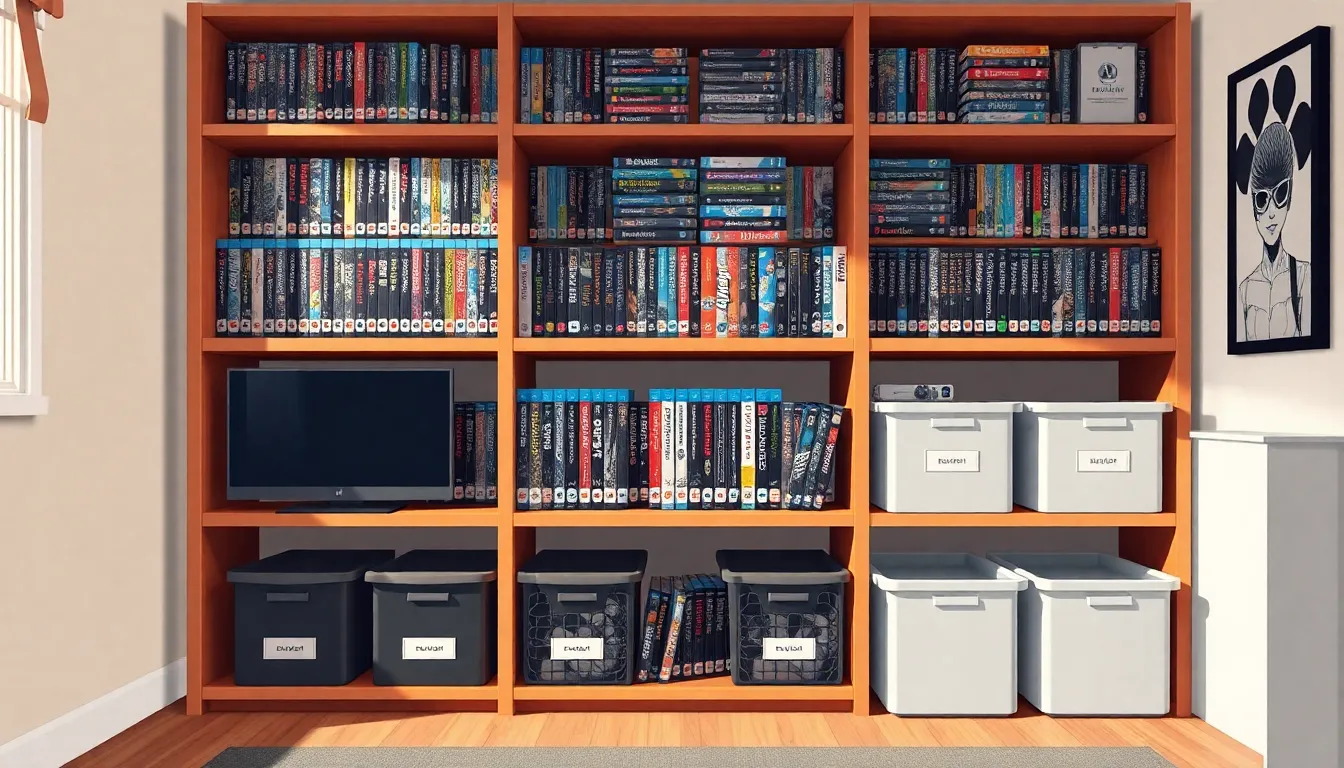In a world where video games multiply faster than rabbits, keeping them organized can feel like a never-ending boss battle. Whether it’s a sprawling collection of physical discs or a digital library that resembles a chaotic junk drawer, gamers often find themselves lost in the pixelated maze. But fear not! Organizing video games isn’t just a chore; it’s the secret weapon to unlocking a more enjoyable gaming experience.
Table of Contents
ToggleImportance Of Organizing Video Games
Organizing video games significantly enhances a gamer’s experience. Clarity emerges in navigating vast collections, allowing quick access to favorite titles. Reduced time spent searching facilitates more quality gameplay.
Physical and digital organization each offers distinct advantages. An organized physical collection maximizes shelf space and curates a tidy environment. Digital organization, on the other hand, improves access through efficient library management.
Efficiency continues with organized collections as it fosters better productivity. Gamers often find information faster, such as game statistics or updates. Task prioritization follows, allowing gamers to focus on their interests rather than navigating clutter.
Social interactions also improve. Sharing organized collections makes recommendations seamless. Discussions about specific titles become easier when games are systematically categorized.
Consolidating games encourages exploration of diverse genres, expanding players’ horizons. Each genre can be grouped by type, console, or release date, revealing hidden gems. A well-organized library naturally invites gamers to revisit titles they might overlook.
In terms of inventory tracking, organization aids in monitoring completed games versus unfinished ones. This clarity motivates commitment to finishing games and achieving personal gaming goals. By making organization a priority, gamers cultivate a more fulfilling gaming journey.
Methods To Organize Video Games

Organizing video games requires a structured approach, whether for physical or digital collections. Implementing effective methods simplifies navigation and enhances the gaming experience.
Physical Organization
Shelving systems provide an efficient way to store physical games. Gamers can categorize titles by genre, alphabet, or release date for quick access. Utilizing storage bins also maximizes shelf space, keeping games safe and easily retrievable. Labels on bins create an easy-to-understand system that makes finding specific games straightforward. Creating a dedicated gaming area fosters better organization, maintaining an inviting and clutter-free environment. Gamers often find that a clean, organized space positively impacts their overall enjoyment.
Digital Organization
Digital libraries require different strategies to maintain clarity. Organizing games into folders or categories streamlines access and reduces time spent searching. Tagging features on platforms allow quick filtering by genre, play status, or completion level, enhancing browsing efficiency. Regularly archiving or deleting unplayed titles helps keep the library focused and manageable. Syncing accounts across devices ensures that favorites are always accessible. Staying organized in the digital space leads to a more productive and enjoyable gaming experience.
Benefits Of Organizing Video Games
Organizing video games improves clarity, enabling quick access to favorite titles. Gamers save time when they locate games easily, leading to more time spent playing instead of searching. Streamlining collections enhances overall enjoyment, creating a satisfying gaming atmosphere.
Physical collections allow for efficient shelving that accommodates various categorization methods. Gamers might sort titles by genre or release date, making it straightforward to find specific games. Creating an easy-to-understand labeling system ensures that everyone can navigate the collection effortlessly. A dedicated gaming area contributes to maintaining a tidy environment that enhances comfort and engagement.
Digital organization encourages gamers to utilize folders and tagging features for better access. Regularly archiving titles no longer played keeps libraries manageable and focused. Syncing accounts across devices promotes seamless access to games, regardless of location or platform.
Social interactions also benefit from organized collections. Sharing curated titles makes recommendations more accessible and enriches discussions about specific games. Consolidation encourages experimentation with different genres, leading to discoveries of hidden gems. Gamers often revisit overlooked titles, adding variety to their experiences.
Tracking inventory becomes streamlined with organization. Monitoring completed versus unfinished games aids in fulfilling personal gaming goals. Gamers often feel motivated to play through their collections as they visualize progress more clearly. Prioritizing organization transforms the gaming journey into a more enjoyable and productive experience.
Tips For Maintaining Organization
Creating a consistent organizational system for video games enhances overall enjoyment. First, categorize physical games using shelves or bins, arranging them by genre or alphabetically. Gamers can label each bin for quick identification.
In contrast, digital libraries require a different approach. Folder creation separates different game types, making access faster. Tagging titles with keywords helps refine searches.
Regularly reviewing collections proves beneficial. Unplayed or completed games can be archived or removed, which keeps libraries focused. Syncing accounts across multiple devices simplifies access and maintains an organized experience across platforms.
Dedicating a specific gaming area leads to a more pleasant environment. A clean space encourages gamers to explore their collections without distraction. Maintaining this tidy setup promotes ongoing organization and invites a better gaming atmosphere.
Sharing curated collections fosters social interaction. Friends can easily recommend titles when they see organized lists. Discussion around specific genres or games becomes more meaningful when collections are visually appealing.
Tracking inventory is crucial for achieving gaming goals. Gamers can monitor completed versus unfinished titles conveniently. This level of oversight cultivates motivation, prompting players to revisit and complete games, enhancing the overall gaming journey.
Overall, by prioritizing a structured approach to organization, gamers create an inviting space that leads to an enriched gaming experience.
Organizing video games is more than just a chore; it’s a pathway to a richer gaming experience. By implementing effective organization strategies, gamers can navigate their collections with ease and discover new favorites. Whether through physical shelving systems or digital tagging, a well-organized library enhances accessibility and promotes exploration.
Maintaining a tidy gaming environment not only fosters enjoyment but also encourages social interactions among gamers. Sharing curated collections can lead to meaningful discussions and recommendations. Ultimately, prioritizing organization transforms gameplay into a more engaging and fulfilling journey, allowing gamers to focus on what truly matters: the joy of playing.



